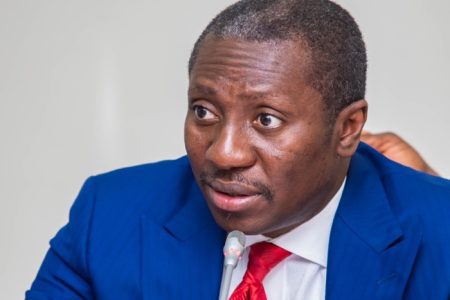The government is poised to present the Free Senior High School (SHS) Bill to Parliament in the coming days, aiming to regulate and ensure the sustainability of the policy.
This initiative comes in response to concerns about potential cancellation by future administrations and the challenges the program has faced.
The proposed bill seeks to solidify the policy’s effectiveness and sustainability, aligning with the aspirations outlined in Chapter 5 of the Constitution.
At a press briefing, Majority Leader and Leader of Government Business in Parliament, Mr. Alexander Kwamina Afenyo-Markin, emphasized the importance of this move to prevent any future government from discontinuing the policy.
Afenyo-Markin explained that while the provisions in Chapter 5 are not currently enforceable by law, the government’s goal is to make them justifiable through legislation.
“The chapter five of the Constitution provides some aspirational indicatives. Those are not justiciable, but once by a policy of the government, an aspiration as a message by the constitution is put into action then to make it justiciable, you enact,” he stated.
He further clarified that although certain constitutional provisions cannot be directly enforced or claimed as rights in court, the proposed legislation would make these aspirations actionable.
“The fact that they are there does not mean that you can apply to the court to enforce those rights, they are aspirational,” Afenyo-Markin noted.
In his remarks during the House’s resumption from the Easter Break for the Third Meeting of the Fourth Session of the Eighth Parliament, Afenyo-Markin urged his fellow Members of Parliament (MPs) to actively participate in the legislative process.
He emphasized the importance of the Free SHS Bill in safeguarding the educational future of Ghana’s youth and ensuring that the benefits of the policy are protected for generations to come.
He also appealed to them to support their respective Committee Leadership and the Leadership of the House to fast-track Government Business to enable the Government work towards improving the living standards of the good people of
Ghana.
He listed a number of priority business to be transacted by the House including Bills to be laid, loan agreements, mining leases and commercial agreements, Instruments, and request for waiver of tax, import duties.
The Majority Leader mentioned that Bills to be taken by the House within the period include the Energy Commission (Amendment) Bill, 2023; the Community Service Sentencing Bill, 2024; the Ghana National Service Authority Bill, 2024, and the Ghana Book Development Agency Bill, 2024.
Others are the University for Engineering and Applied Sciences (Ankrodie) Bill, 2024; the University for Health, Agriculture and Life Sciences (Kintampo) Bill, the University of Mampong Bill, 2024; the University of Sports and Development Bill, 2024; the Colleges of Applied Arts, Science and Technology Bill, 2024; the Business Regulatory Reform Commission Bill, 2024; and the Conduct of Public Officers Bill, 2024.
The rest are the Economic and Organised Crime Office (Amendment) Bill, 2024; the Legal Profession Bill, 2024; the Presidential Transition (Amendment) Bill, 2024; the Environmental Protection Agency Bill, 2024; the Fisheries and Aquaculture Development Bill, 2024; the Ghana Housing Authority Bill, 2024; the Rent Bill, 2023; the Minerals and Mining (Amendment) (No.2) Bill, 2024; the Broadcasting Bill, 2024; the Internal Audit Agency Bill, 2024; the Ghana Deposit Protection (Amendment) Bill, 2024; the Fees and Charges (Miscellaneous Provisions) (Amendment) Bill, 2024; and Ghana Investment Promotion Centre (Amendment) Bill, 2023.
Mr Afenyo-Markin noted that there were also a few statutory Reports that ought to be laid and considered by the House.
These include the Annual Report on the Management of the Energy Sector Levies and Accounts for the Year 2023; the Annual Public Debt Management Report for the 2023 Financial Year; the Reconciliation Report on the Petroleum Holding Fund for the Year 2023; Annual Report on Public Private Partnership Projects for the Year 2023; and the Annual Report on the Petroleum Funds for the 2023 Fiscal Year.
Others are the Annual Report on the Management of the Energy Sector Levies and Accounts for the Year 2022; the Annual Public Debt Management Report for the 2022 Financial Year; the Reconciliation Report on the Petroleum Holding Fund for the Year 2022; and Annual Report on Public Private Partnership Projects for the Year 2022.
The rest are the Annual Report on the Petroleum Funds for the 2022 Fiscal Year; and the Annual Report on the Collection and Utilisation of the African Union Import Levy for the 2022 Fiscal Year.
- Tameklo calls on security agencies to support fuel stations to operate 24 hours - 26 March 2025
- Names of all 73 MMDCEs for 8 regions released - 26 March 2025
- Abolished E-Levy awaits President Mahama’s assent - 26 March 2025

